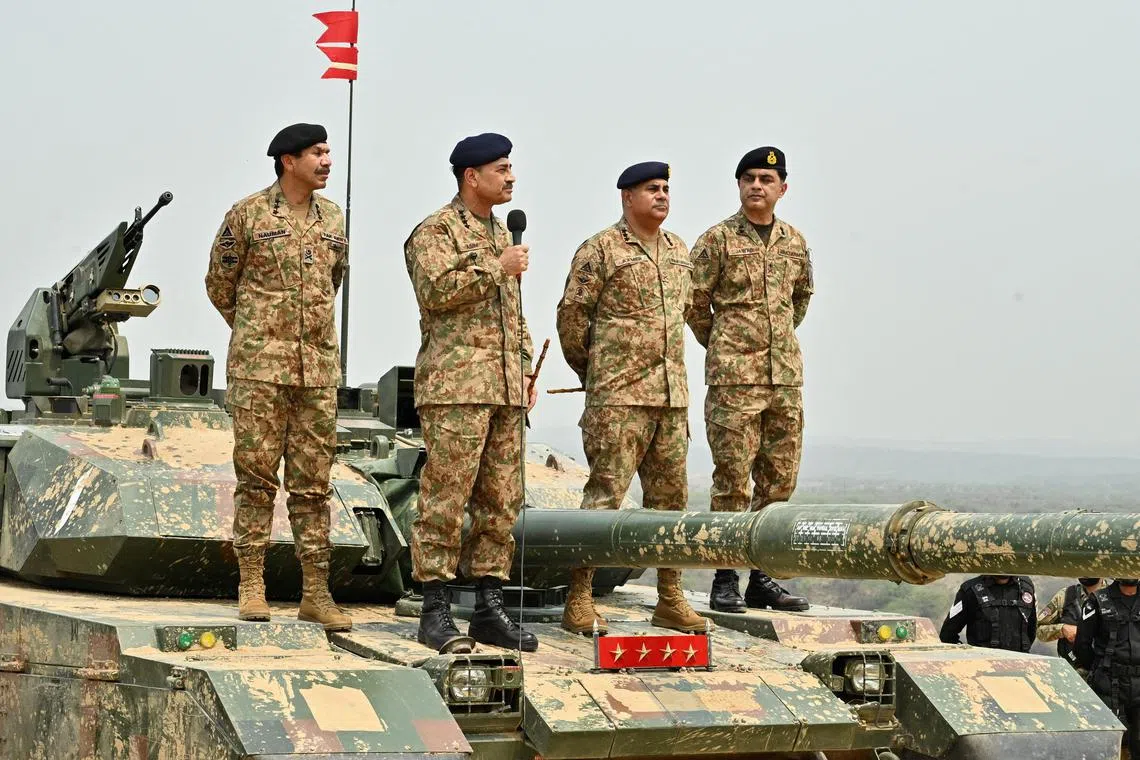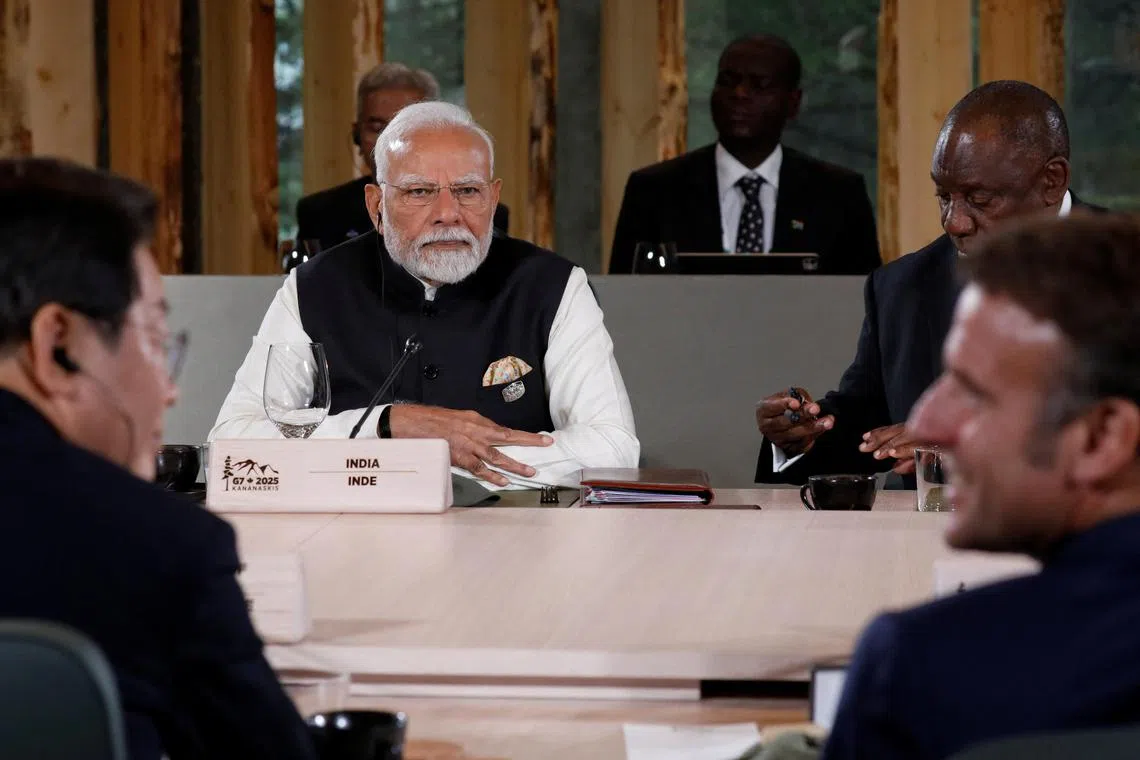Trump hosts Pakistani army chief; disagrees with India over India-Pakistan war mediation
Sign up now: Get ST's newsletters delivered to your inbox

Pakistani armed forces chief Asim Munir (second from left) joined US President Donald Trump for lunch at the White House on June 18.
PHOTO: REUTERS
WASHINGTON/ISLAMABAD/NEW DELHI – US President Donald Trump hosted Pakistan’s army chief Asim Munir at the White House on June 18, in an unprecedented meeting that risked worsening a disagreement with India over the President’s claim that he stopped the recent war between the nuclear-armed South Asian foes.
It was the first time that a US president has hosted the powerful head of Pakistan’s army, widely regarded as having sway over the country’s national security policies, at the White House unaccompanied by senior Pakistani civilian officials.
Mr Trump said he was honoured to meet Field Marshall Munir and that they had discussed Iran, which he said Pakistan knew better than most.
Mr Trump told reporters he had thanked Field Marshall Munir for ending the war with India, for which he also praised Indian Prime Minister Narendra Modi, whom he spoke to on the night of June 17.
“Two very smart people decided not to keep going with that war; that could have been a nuclear war,” Mr Trump told reporters.
Pakistan’s military said in a statement that the two discussed trade, economic development and cryptocurrency during the two-hour meeting and also exchanged views on tensions between Israel and Iran.
“President Trump expressed keen interest in forging a mutually beneficial trade partnership with Pakistan based on long-term strategic convergence and shared interests,” the army said.
Field Marshal Munir was expected to press Mr Trump not to enter Israel’s war with Iran
A section of Pakistan’s embassy in Washington represents Iran’s interests in the US, as Tehran does not have diplomatic relations with Washington.
Pakistan has condemned Israel’s air strikes against Iran, saying they violate international law and threaten regional stability.
The meeting represented a major boost in US-Pakistan ties, which had largely languished under Mr Trump and his predecessor Joe Biden, as both courted India as part of efforts to push back against China.
Asked earlier what he wanted to achieve from the meeting, Mr Trump told reporters at the White House: “Well, I stopped a war... I love Pakistan. I think (Indian Prime Minister Narendra) Modi is a fantastic man. I spoke to him last night. We’re going to make a trade deal with Modi of India.
“But I stopped the war between Pakistan and India. This man was extremely influential in stopping it from the Pakistan side, Modi from the India side and others,” he said, referring to Field Marshal Munir.
“They were going at it – and they’re both nuclear countries. I got it stopped.”
White House spokeswoman Anna Kelly said Mr Trump hosted Field Marshall Munir after he called for the President to be nominated for the Nobel Peace Prize for preventing a nuclear war between India and Pakistan.
No mediation
Mr Trump had said in May that the nuclear-armed South Asian neighbours agreed to a ceasefire
However, Mr Modi told Mr Trump in a phone call late on June 17 that the ceasefire was achieved through talks between the Indian and Pakistani militaries and not US mediation, according to India’s most senior diplomat, Foreign Secretary Vikram Misri.
Pakistan has thanked Washington for playing a mediating role, however, while India has repeatedly denied any third-party mediation.
The June 17 phone call between Mr Modi and Mr Trump was the two leaders’ first direct exchange since the May 7 to 10 conflict.
“PM Modi told President Trump clearly that during this period, there was no talk at any stage on subjects like India-US trade deal or US mediation between India and Pakistan,” Mr Misri said.
“Talks for ceasing military action happened directly between India and Pakistan through existing military channels, and on the insistence of Pakistan. Prime Minister Modi emphasised that India has not accepted mediation in the past and will never do,” he said.

Indian Prime Minister Narendra Modi attending a G-7 Leaders’ Summit in Canada, on June 17.
PHOTO: REUTERS
Mr Misri said the two leaders had been due to meet on the sidelines of the G-7 summit but Mr Trump left a day early
Mr Trump asked Mr Modi if he could stop by the US on his return from Canada, Mr Misri said, but the Indian leader expressed his inability to do so due to a pre-decided schedule.
The heaviest fighting in decades between India and Pakistan was sparked by an April 22 attack in Indian Kashmir
Pakistan has previously said that the ceasefire happened after its military returned a call the Indian military had initiated on May 7.
On May 7, Indian jets bombed what New Delhi called “terrorist infrastructure” sites across the border, triggering tit-for-tat strikes spread over four days in which both sides used fighter jets, missiles, drones and artillery.
Mr Michael Kugelman, a senior fellow at the Asia Pacific Foundation think-tank, said ties between India and the US, which have thrived in recent years, could suffer if Mr Trump continued to make remarks about a US role in the ceasefire and offered US mediation on Kashmir, a disputed Himalayan territory that India and Pakistan both claim.
“For Delhi, it all boils down to an age-old question: How much can it tolerate US-Pakistan cooperation without having it spoil US-India relations – a partnership that’s thrived in recent years despite continued US-Pakistan links,” Mr Kugelman said. REUTERS


